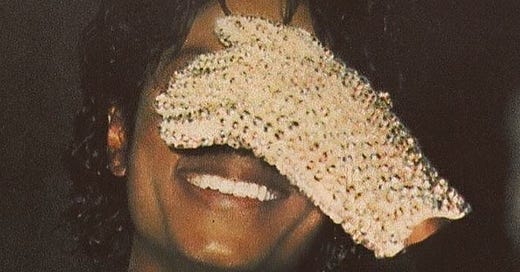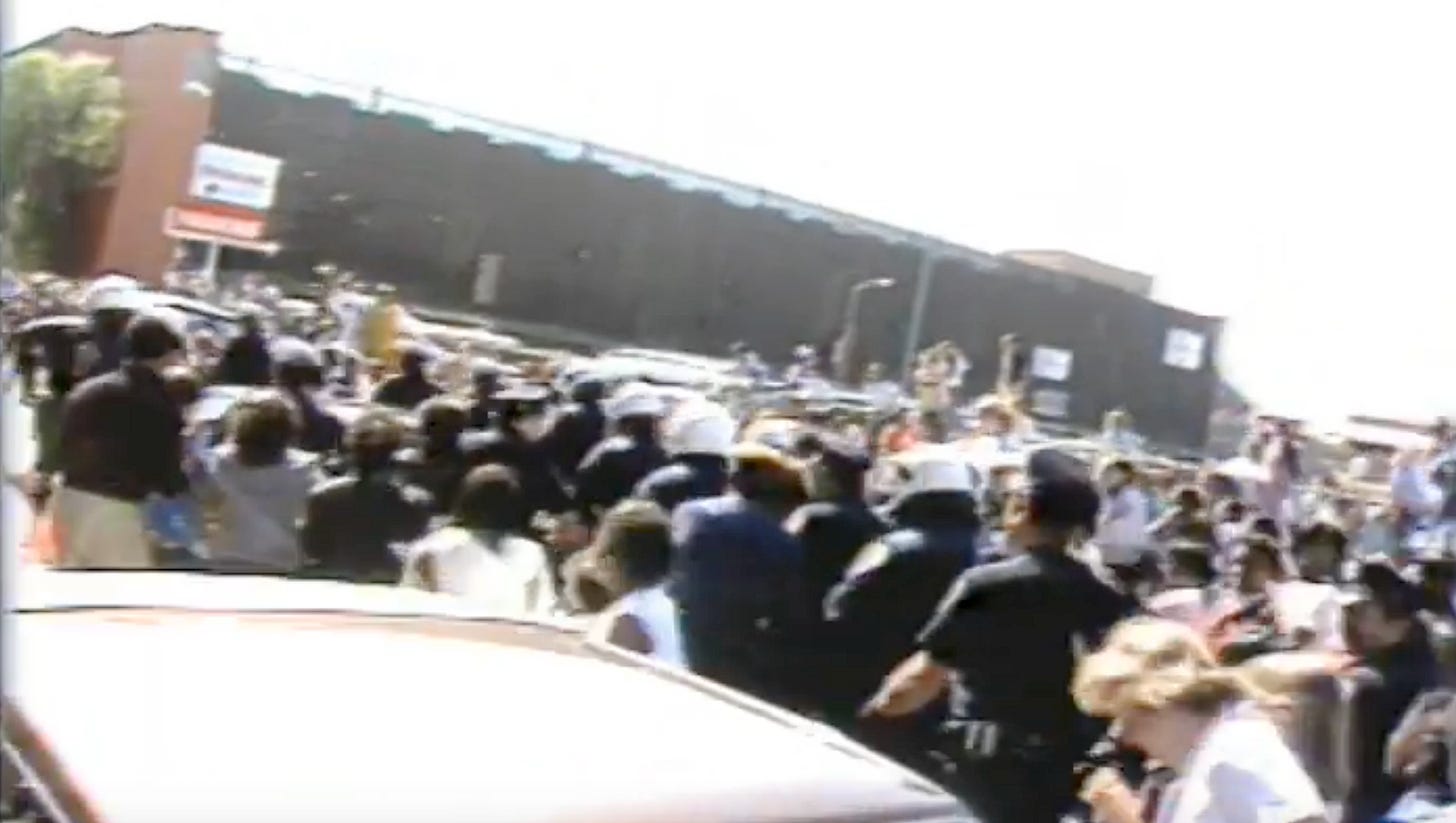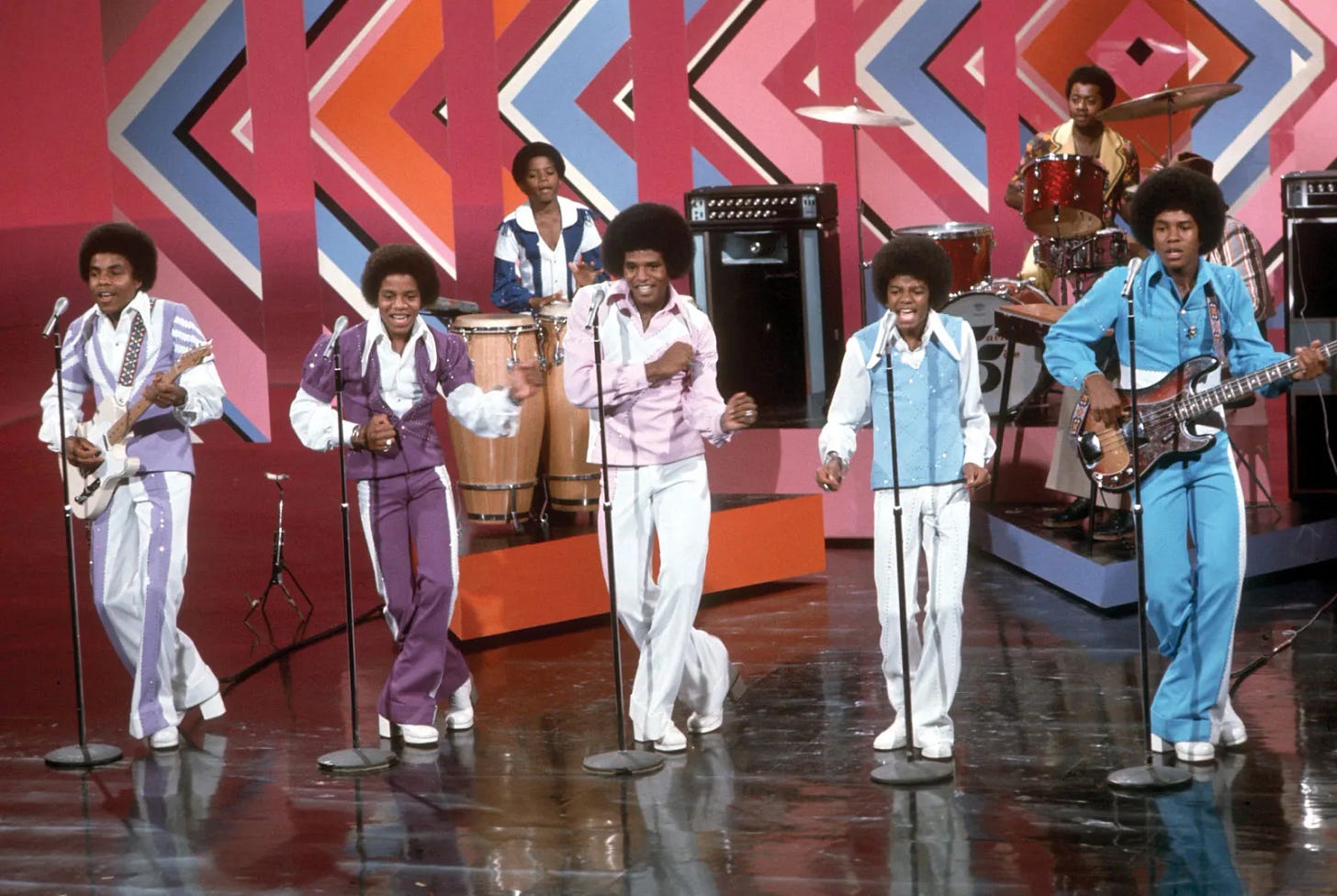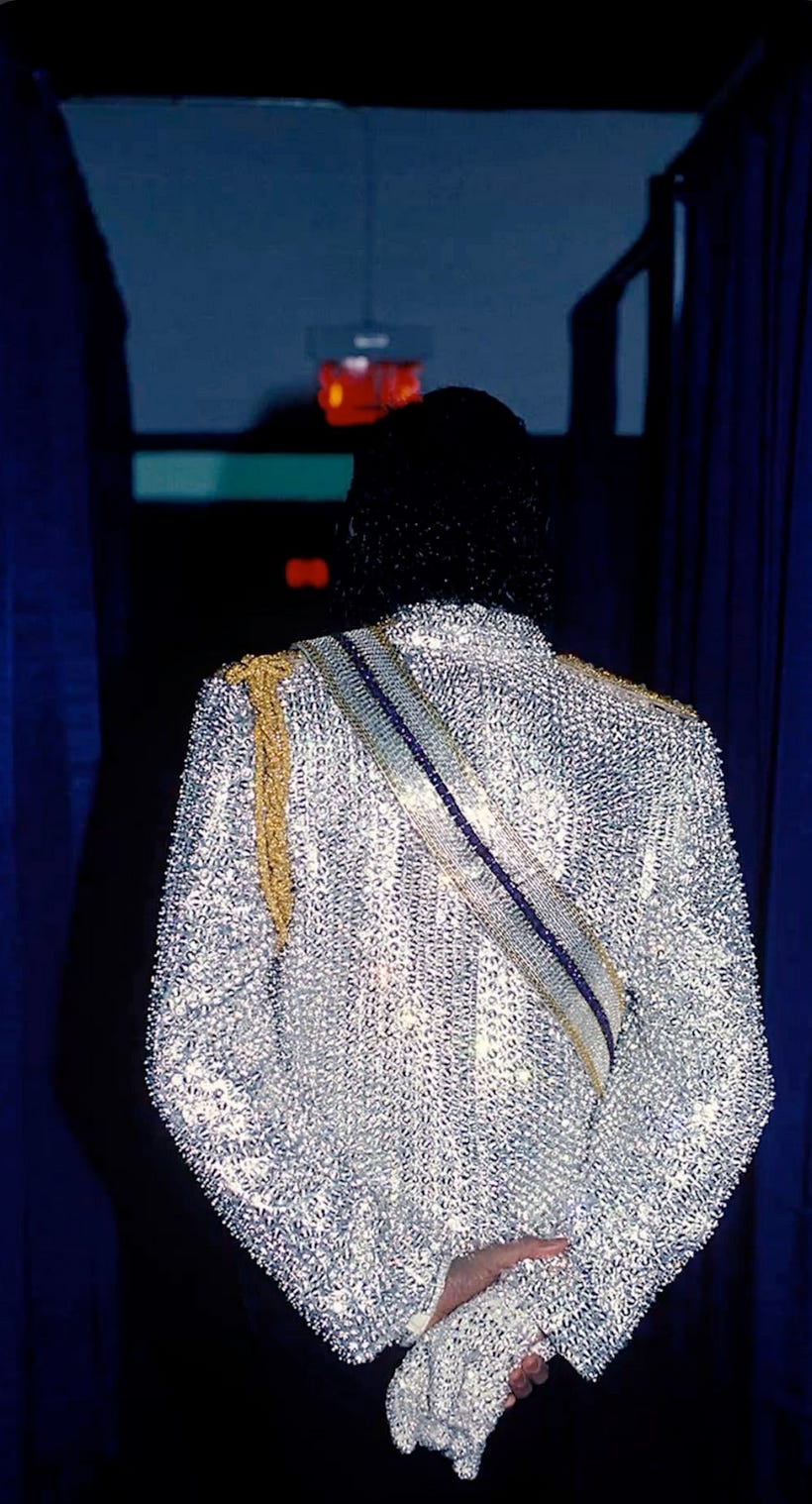#46 The Deadly Fame of Michael Jackson
If anyone lived the Truman Show experience, it was definitely Michael...
Michael Jackson might have been the most famous person to ever exist — besides prominent religious figures.
Sometimes, I think about how famous he was, especially at the height of his popularity. I was barely around when he was alive, being only 7 when he died in 2009, but I still knew about him. His well-known songs, the iconic moonwalk, the legendary glove.
It was unreal. He was SO SO SO famous.
Everyone knew who Michael Jackson was.
Here a couple stats that ChatGPT gave me about Michael Jackson’s fame and influence. All of the sources are highlighted and can be clicked on.
Commercial Success:
Thriller remains the best selling album of all time with estimated sales of 70 - 100 million copies globally
He has sold over 400 million records worldwide.
13 Grammy awards and 13 Billboard Hot 100 #1 singles (more than any other male artist in history).
Global Reach:
The 1993 Super Bowl Halftime show that he performed at had over 133 million viewers.
His 1995 TV special which was the video premiere of his song “Black or White” reached 500 million viewers in 100+ countries.
During peak years (1983–1993), Jackson was on the cover of over 1,500 magazines.
Media Coverage:
He is considered one of the most photographed people in the world during the 1980s.
1983’s Motown 25 performance, where he debuted the moonwalk, was watched by 47 million Americans, spiking his fame overnight.
Endorsements and Fan Base:
First black artist to sign a major brand endorsement: the $5 million Pepsi deal in 1984 (worth ~$13 million today), the largest ever at that time.
In 1984, Michael Jackson's earnings were estimated at $91 million, adjusted for inflation would it to $205 million.
At his peak, his official fan clubs claimed millions of registered members across 60+ countries.
When Michael Jackson died, a large number of people watched his funeral.
I can’t confirm the legitimacy of the number of viewers that watched his funeral because it seems like it was watched on multiple different platforms — streaming, different TV networks, and more. This Wikipedia article though, describes the global response to his death and I believe the numbers are not too far off from the actual viewership.
“The broadcast was prioritized by many media companies all over the world, and all other programming apart from the memorial was suspended. The service was broadcast live around the world, from the U.S. to Slovakia (Eastern Europe) to parts of Asia and Oceania, making use of the Intelsat global satellite network.
Public screenings were held in 88 cinemas across the U.S. as well as in Barcelona, Berlin, Brussels, Bucharest, Gothenburg, Lisbon, London, Madrid, Malmö, Oslo, Paris, Milan, Seville, Stockholm, and Tallinn. There was also a live broadcast at 3am in Melbourne, Australia, at Federation Square.
Before the event, the organizers expected an estimated one billion viewers. According to Nielsen, 31.1 million Americans watched the service live on television, an amount comparable to the 35.1 million that watched the state funeral of Ronald Reagan in 2004, while over 59.5 million U.S. viewers tuned in via streaming. It was estimated that more than 2.5 billion people watched the event worldwide, which makes it the most watched non-sports television broadcast in history.”
That’s absolutely insane if those numbers are true.
This viewership would rival the Apollo 11 Moon Landing (600 million people) and Princess Diana’s funeral (Estimated 2.5 billion people).
Aside from the statistics, I’ve been watching interviews and footage of Michael, especially when he would go out in public.
Honestly, it was absolutely madness wherever he went.
Airports, concerts, malls. People would react in a screaming frenzy if they saw him and would climb over each other just to get a glimpse. People would start breaking down and crying, while others shouted MICHAEL!!! at the top of their lungs. He would then get into his car, only for people to chase the car down several blocks!
He couldn’t go anywhere without it turning into mayhem.
Whenever he went to cities while on tour, he was often given security that was fit for a president. Some cities would even declare public holidays when he would arrive.
In this video clip, Michael performs at a concert where he just stands still for several minutes when he first comes out on the stage.
Literally, he just stands there.
He stands motionless for 10 minutes except for when he slowly takes off his sunglasses.
The exhilaration of seeing Michael after waiting for many hours causes many fans to faint. You can see the camera pan to security pulling fans who fainted out of the crowd.




One of the reasons that his mere presence triggered this type of reaction was that he seemed almost mythical to some people.
This man was known everywhere on the planet — and that statement reaches a whole other level when you realize it was in the time of no internet.
I’ve heard a saying that goes like no matter what religion, race, language, or age someone was, they knew of Michael Jackson and his music.
Is that true?
Well I don’t know for sure, but I did find two interesting videos that might speak to this.
In the first video, researchers show different videos of society to an Amazon tribe that had largely been uncontacted. They showed clips such as the moon landing, a soccer player scoring a goal, 9/11, and Michael Jackson moonwalking.
Every time they showed a video, they would pause and ask if anyone recognized what they were just shown. The tribesmen hadn’t seen any of the footage except, for when they were shown Michael. The elders had not heard of him, but the younger members had, and raised their hands when asked how many knew who he was.
In a similar video, remote tribal people from India were asked if they had heard about Michael Jackson. Although some had not, some recognized the name, even if they had not seen what he looked like or experienced his music.
Michael always seemed deeply aware of how his extraordinary fame shaped his life.
In the well-edited video below, Michael candidly talks about all of this. It’s so interesting to hear and I’m going to extract a couple of key parts that I think are worth sharing.
The opening of the video immediately sets the tone with Michael saying,
“I don’t think people understand the other side that comes with it [fame]. They are so quick to call you strange and weird, but it’s almost like you are forced to be different.”
It then transitions to him talking about growing up and performing with his brothers in the Jackson 5. They toured the country, playing for stadiums and dropping chart-topping songs.
An older Michael comments on living this lifestyle as a young kid,
“Wherever the Jackson 5 went, there were mob scenes. We couldn’t go anywhere. We had hit records back to back to back and were playing big arenas across America. We did have a chance to have some fun, but in the hotel room. I went to a public school once for one week and it got so bad as the fans would come into class and chase us around.”
The video then shifts to eerie music and shows an older Michael in an interview that looks like it was recoreded around the peak of his career. Michael says,
“I get afraid of, well, if I don’t know people. I get afraid of people sometimes. There’s a whole other life that I haven’t really experienced. Like friendship is something that I’m just beginning to learn about.
I was raised on stage. That’s where I’m comfortable. Everything else is foreign to me. I’m just beginning to learn about people, friendship.”
He next mentions, what it’s like going out as himself with screaming mobs chasing him,
“People, they just go, they really go crazy. They feel very happy to see you. It feels as if they know you and you have to respond back like you know them. They feel that they personally know you. My pictures are on their walls, my music is playing in their house.
I don’t think you would find me in a disco or nightclub. All of those places are fun if that’s what you like to do. Just when I go to places like that, it becomes work instead of pleasure. They announce that I’m there over the loudspeakers and they play all of my records and I’m signing autographs… As soon as I go in the club, every song is my song as if I want to hear my music and everyone is chanting for me to dance. It becomes a show all over again.”
I can’t even imagine myself being in that position, where no matter where you go, all eyes are always on you and people want you to perform. You are more of an object or persona in your fans’ eyes than an actual human being.
Like a monkey performing a circus act.
Because of this, at times, Michael would dress up in disguises so that he wouldn’t be recognized in public.



Michael mentions he did this for one simple reason that the majority of us take for granted: ‘I enjoy doing it because I get to see life the way it really is sometimes.’
At one point, MJ had his friend shut down a grocery store, and had friends and family pretend to be customers while he shopped in the store. He did it because he never had a normal experience of shopping alone.
He also knew that he wasn’t any different than anybody else, he just had an unique talent of singing, dancing, and a spotlight to show that:
“I somewhere see myself like you or the people in this room.
I’m human just like you are… I’m no better than you are. I mean, I have a certain talent with my art and songwriting and dancing and the drama and the whole thing.
So it’s no right for me to think that I’m better than you or have an ego to walk on air. There are lots of people in my field who are like that. And most of those people, they fall. They really do. They begin to treat people who help them badly and to forget where they came from and to forget about those who helped them get where they are.”
With all of this fame and attention — especially raised to the most extreme level — Michael couldn’t help but feel profoundly alone. In one of the interviews, Michael speaks about how he used to be lonely, painfully lonely and it’s sad to hear. You can even hear his voice break a little when he mentions this.
He explains how he would have to hide in his hotel rooms, which felt like a prison whenever he traveled. This was because there were always crowds of fans who waited outside of the hotel 24/7, hoping to get a glimpse of Michael. He woefully tells the interviewer,
“When there’s thousands of fans chanting [your name outside of the hotel room]… they’re chanting because they love you and everything. You feel trapped inside and just cry. You feel lonely and there’s all that love out there.”
I think there is something to be said about how there is a price to being famous that most people never see. Of course, Michael Jackson was fame at its most extreme, but it’s important to realize that with fame, you may have attention and possibly money, but you have to deal with people knowing the idea of you, not the real you.
The version people see online or on TV of someone is completely different from the experience of getting to know someone slowly and organically in real life.
In this case with Michael, if you take the music, dancing, and fame away, he was just a regular guy.
He wasn’t a god.
I even think that he is the closest person you can compare to who was like Truman in The Truman Show — a movie about a man who lived in artificial bubble and whose life was a TV show that was constantly recorded and broadcasted 24/7.
I don’t wish anyone to have the level of attention that Michael had. It’s just too much for one person to bear. I think it was too much for Michael to bear himself…
At the end of this article, let me leave you with one final somber quote.
At Michael Jackson’s funeral in 2009, Michael’s brother, Marlon Jackson said, “Maybe now, Michael, they will leave you alone.”
See you next week,
-Justin


















